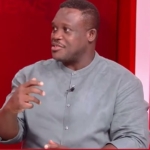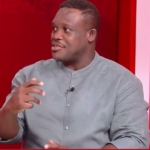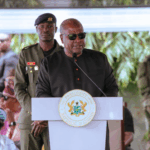
The Minister for Communication, Digital Technology, and Innovation, Sam Nartey George, has provided details of the standoff with satellite television provider MultiChoice, operator of DStv, accusing the company of disrespect, systemic operational failures, and a history of “fleecing” Ghanaian consumers.
In an interview on Joy FM’s Super Morning Show on Tuesday, August 12, the minister detailed a breakdown in negotiations over subscription prices, culminating in a 30-day notice to suspend the company’s broadcasting licence, which is set to take effect on September 6.
At the heart of the dispute is the minister’s non-negotiable demand for a 30% reduction in DStv subscription fees.
“I had made a request for 30%,” Mr. George stated. “There’s a reason behind the 30%. In April this year, MultiChoice increased their prices by 15%… at that time, the cedi had appreciated by about 10% against the dollar… So there was absolutely no justification for that 15%. So I’m reversing that 15% and then demanding a further 15% for the Ghanaian people.”
A pattern of disrespect and bad faith
The minister painted a picture of a company unwilling to engage in good faith, citing several instances of what he termed “disrespect”.
He revealed that after he presented his case, MultiChoice responded not with a counter-offer but with a nine-page letter filled with economic forecasts.
“They wrote me a nine-page letter with six graphs and bar charts explaining to me the instability of Ghana’s economy and how our cedi appreciation cannot be trusted to be sustainable,” he recounted with disbelief.
“I wrote back to them and asked them, ‘Since when did MultiChoice become an economic forecasting institution?’ … and sent them links from the IMF, Fitch, and Standard & Poor’s on the future outlook of Ghana’s economy.”
The standoff escalated when MultiChoice allegedly attempted to bypass the ministry.
“They wrote to my regulator, the NCA [National Communications Authority], asking the NCA to write to them confirming that the NCA would not comply with my directive as minister… You write to my regulator; you don’t copy me,” the minister fumed.
Operational failures and revenue leakage
Beyond pricing, Mr. George highlighted critical operational failures, chief among them being cross-border piracy.
He claimed that a staggering “40 to 45% of DStv devices in Ghana today are all devices from Nigeria”, a situation he says MultiChoice has failed to tackle.
This influx of Nigerian-registered devices, he argued, allows MultiChoice to collect revenue while the Ghanaian state loses out on tax, and it artificially suppresses Ghana’s official subscriber numbers, which the company then uses to justify its high prices.
“When you say you have a low subscription in Ghana, it’s because your prices are not uniform and have led to cross-border piracy on your platform,” he charged.
The minister cited regional precedents where regulators took a hard line, forcing MultiChoice to adjust its practices.
“In Malawi, in 2023… they just shut them down… MultiChoice went to court, lost the case, and four months later came back, offered one week free… and dropped the prices. In Liberia… they slashed the premium package by $30. In Nigeria in 2024… the Nigerian House of Reps passed an instruction prohibiting the increases.”
Industry reacts as Canal+ takeover looms
The public standoff comes at a pivotal moment for MultiChoice, which is in the final stages of a complete takeover by French media giant Canal+.
The deal, approved by South Africa’s Competition Tribunal in July, is expected to be finalised soon.
Responding to the developments, Alex Okyere, Managing Director of MultiChoice Ghana, has previously stated that the minister’s proposed reduction is “not tenable” given the “extremely challenging macroeconomic environment”.
In a statement, the company warned of the “dire implications that an impasse may have on livelihoods” and affirmed its commitment to finding a resolution through dialogue.
In Johannesburg, a spokesperson for MultiChoice Group CEO, Calvo Mawela, reiterated their commitment to the Ghanaian market but stressed that “pricing is a complex issue influenced by content acquisition costs, currency volatility, and local operational expenses.” We must ensure a sustainable model that allows for continued investment in quality content and technology for our customers.”
The impending change in ownership adds a new dimension to the conflict. Mr George revealed that he has already been in contact with the incoming owners.
“Canal+ has reached out,” he confirmed, “and I’ve made it clear to them if they want to come into Ghana and operate… this is our request. Canal Plus’s attitude is light years more positive than that of MultiChoice.”
From Paris, the office of Canal+ CEO, Maxime Saada, issued a cautious statement.
“We are closely monitoring the situation in Ghana. Canal+ has a long and successful history of working collaboratively with regulatory bodies across Africa. Upon the successful completion of our acquisition of MultiChoice, we look forward to engaging directly with the Ministry and all stakeholders to build a future that serves the interests of Ghanaian audiences and the creative industry.”
With the 30-day countdown ticking towards the September 6 deadline, the future of DStv in Ghana hangs in the balance.
Consumers, caught in the middle, are watching keenly to see if the regulatory pressure will lead to lower prices or if the EPL and other popular content will go dark, at least temporarily, as a new French era for the African pay-TV giant begins.
- President Commissions 36.5 Million Dollars Hospital In The Tain District
- You Will Not Go Free For Killing An Hard Working MP – Akufo-Addo To MP’s Killer
- I Will Lead You To Victory – Ato Forson Assures NDC Supporters
Visit Our Social Media for More




